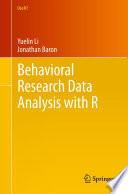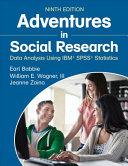This book highlights the rise of the Strauss-Corbin-Gioia (SCG) methodology as an important paradigm in qualitative research in the social sciences, and demonstrates how the SCG methodology can be operationalized and enhanced using RQDA. It also provides a technical and methodological review of RQDA as a new CAQDAS tool. Covering various techniques, it offers methodological guidance on how to connect CAQDAS tool with accepted paradigms, particularly the SCG methodology, to produce high- quality qualitative research and includes step-by-step instructions on using RQDA under the SCG qualitative research paradigm. Lastly, it comprehensively discusses methodological issues in qualitative research. This book is useful for qualitative scholars, PhD/postdoctoral students and students taking qualitative methodology courses in the broader social sciences, and those who are familiar with programming languages and wish to cross over to qualitative data analysis. "At long last! We now have a qualitative data-analysis approach that enhances the use of a systematic methodology for conducting qualitative research. Chandra and Shang should be applauded for making our research lives a lot easier. And to top it all off, it’s free." Dennis Gioia, Robert & Judith Auritt Klein Professor of Management, Smeal College of Business at Penn State University, USA “While we have a growing library of books on qualitative data analysis, this new volume provides a much needed new perspective. By combining a sophisticated understanding of qualitative research with an impressive command of R, the authors provide an important new toolkit for qualitative researchers that will improve the depth and rigor of their data analysis. And given that R is open source and freely available, their approach solves the all too common problem of access that arises from the prohibitive cost of more traditional qualitative data analysis software. Students and seasoned researchers alike should take note!” Nelson Phillips, Abu Dhabi Chamber Chair in Strategy and Innovation, Imperial College Business School, United Kingdom "This helpful book does what it sets out to do: offers a guide for systematizing and building a trail of evidence by integrating RQDA with the Gioia approach to analyzing inductive data. The authors provide easy-to-follow yet detailed instructions underpinned by sound logic, explanations and examples. The book makes me want to go back to my old data and start over!" Nicole Coviello, Lazaridis Research Professor, Wilfrid Laurier University, Canada "Qualitative Research Using R: A Systematic Approach guides aspiring researchers through the process of conducting a qualitative study with the assistance of the R programming language. It is the only textbook that offers “click‐by-click” instruction in how to use RQDA software to carry out analysis. This book will undoubtedly serve as a useful resource for those interested in learning more about R as applied to qualitative or mixed methods data analysis. Helpful as well is the six‐step procedure for carrying out a grounded‐theory type study (the “Gioia approach”) with the support of RQDA software, making it a comprehensive resource for those interested in innovative qualitative methods and uses of CAQDAS tools." Trena M. Paulus, Professor of Education, University of Georgia, USA
This book highlights the rise of the Strauss-Corbin-Gioia (SCG) methodology as an important paradigm in qualitative research in the social sciences, and demonstrates how the SCG methodology can be operationalized and enhanced using RQDA.










